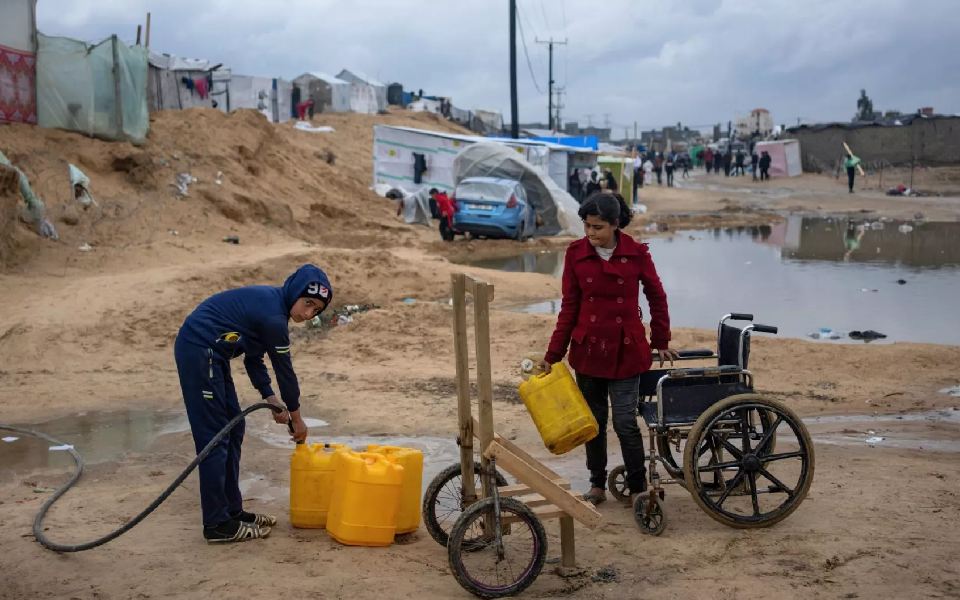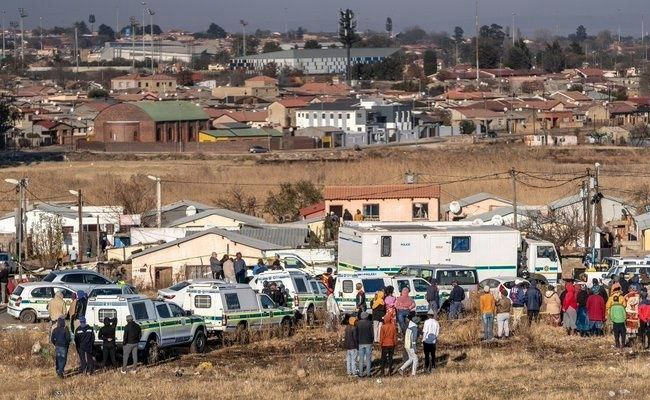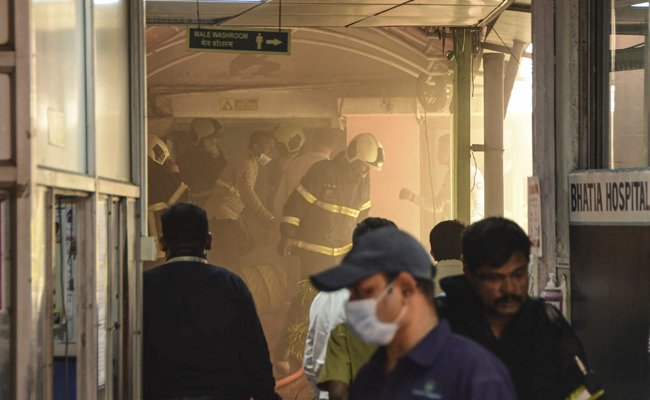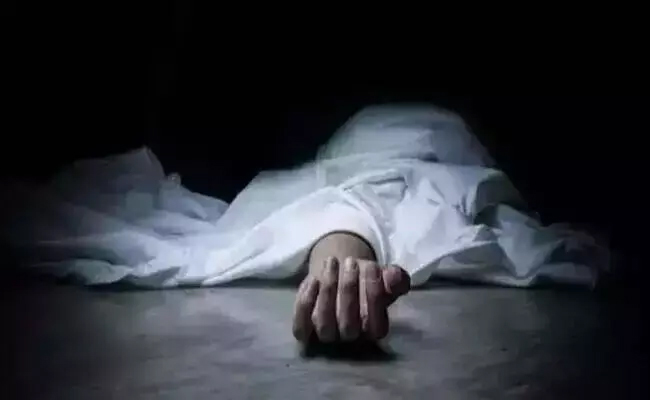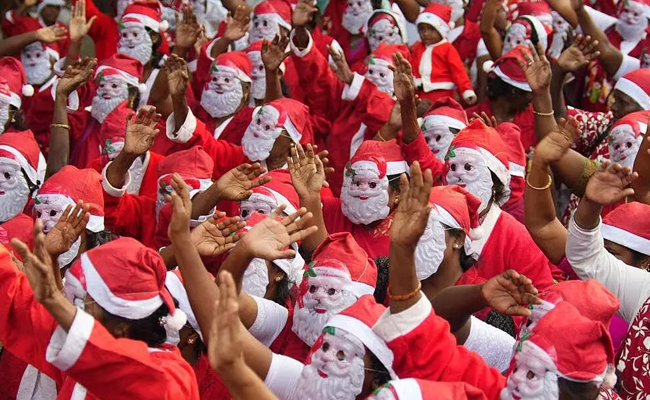Gaza: "This is not life", Nehal tells Salim Oweis. Hundreds of tents of displaced people dot the scene around her in Deir al-Balah. She is waiting to collect water from the UNICEF tankers that supply one of the critical needs of war torn Gazan cities. Oweis is with the UN agency to provide humanitarian assistance to Palestinians, especially the children. Nehal, who has a toddler beside her, tells Owais how they lack clean water and enough food. Not even proper drinking water is available, she says. "We can't even sleep properly like normal people do... We are very exhausted", she looks away.
Nehal's husband shows Oweis the tiny feet of his toddler. They are covered with pink rashes. "They are from living in the camp", he says. With a resigned expression on his face, he tells Oweis how the tents they sleep in are infested with large worms and bugs due to lack of sanitation. "We are living in very bad conditions here", he tells.
Sewage water runs over the streets of Deir al-Balah. Lack of clean water has made life horrible for already struggling refugees. The sanitation system is destroyed and the sewage treatment plants do not function. Diarrhea and skin diseases are on the rise. Polio, a disease unheard of in most parts of the world today, was detected in the sewage waters of Gaza, throwing light on the decades of neglected health care in the occupied territories. "The situation here is horrible; this is not normal living", Oweis tells on the camera. Children in Gaza, the worst affected victims of the ongoing conflict, are in desperate need of humanitarian aid, including water. However, he knows that a ceasefire is what they need above all.
Bushra Khalidi is the Palestinian policy lead for Oxfam, a confederation of British NGOs that has been working for the Palestinian refugees since 1950s. Speaking recently with the Israeli left-wing newspaper Haaretz, she said that the average amount of water available to a resident of Gaza each day was lesser than what one would use in a single toilet flush. A report by the group titled ‘Water War Crimes: How Israel has Weaponised Water in its Military Campaign in Gaza ', published in July 2024, stated that Israel controlled most of the water resources in all occupied territories and the Palestinian were allowed only 20% share in them, while the remaining lion's share went to the Israeli settlers.
It also threw light on the role Mekorot, Israel's national water company, played in Gazan water crisis. Despite directed by International laws to provide basic needs to an occupied territory, Israel sells water at a high price to the Palestinians who are prevented from constructing any new water installation, through a military order that dates back to 1967, without the permission of Israeli army. In 2021, Mekorot earned around $98 million by selling water to Palestinian Water Authority in Gaza. The report states that the company's monopoly over the water resources in Palestinian areas had turned it into a significant force that aids and abets the occupation. Moreover, deep water drilling by Mekorot in the Jordan valley caused the Palestinian wells and springs to dry up. During any shortage of water supply to the Israeli settlements who always got their 80% share, the company would shut off the valves supplying water to the Palestinian communities.
After the Israeli offensive began following the October 7 attacks by Hamas, water lines to various municipalities of Gaza City, Khan Younis and Deir al-Balah were cut off by Mekorot. During the war, Israel has repeatedly attacked water and sanitation facilities in Gaza. Along with this, the restrictions on entry of spare parts and fuel led to water production drop by 84% inside the Palestinian territory. Despite the Israeli Government ordering for the reactivation of Mekorot lines of Bani Suhaila and Bani Saeed on 31 October 2023, Khan Younis did not receive water for 188 days when the lines stopped functioning again in December. Gaza City, which was deprived of water for 219 days, was resupplied only after May 16 this year.
In mid-July, the 401st Brigade of the IDF's armored Corps blew up a main water reservoir in the Tel al-Sultan neighbourhood in Rafah. A solider who shared the video of the abhorring act on social media wrote: “The destruction of Tel Sultan’s water reservoir in honor of Shabbat.” Haaretz reported that the explosion was done with the approval of the commander of the troops. However no approval had been sought from the IDF Southern Command. Rafah offensive, which began on 6 May, displaced more than three million Palestinians who had taken refuge in the city after fleeing other parts of Gaza which were under attack. Closing of Rafah and Kerem Shalom crossings led to a worsening humanitarian crisis as it effectively prevented major aid flowing to Gaza. By the end of May, UN had to cease its food distribution in Rafah as it had run out of supplies.
When Abu Muhammed Jumaa, came to Khan Younis after being displaced from Nuseirat camp, the city was out of water for more than a few weeks, once gain. Getting a paltry amount of water for dire needs was extremely difficult. It was the early days of Dhul-Hijjah, the holy month when Muslims from all over the world flock Mecca to perform the rites of Hajj. Going without water even for a simple ablution before salath during such revered days was unimaginable for him. Eid al-Adha, the feast of sacrifice which commemorates Prophet Ibrahim and his son Ismael, was fast approaching. When Inas al-Ghoul told him she could provide clean drinking water, he could not believe his ears. Before the war, Al-Ghoul worked as an agricultural engineer under the Palestinian Authority in Khan Younis area. Jumaa wondered how this woman could provide clean water to him when almost all desalination plants around them had been rendered useless by the Israelis systematically.
Inas Al-Ghoul has no fancy apparatus to achieve this complicated task. "Necessity is the mother of all inventions", she tells Palestinian News Network (PNN) while showing her solar distiller that purifies sea water. She takes us to a sloping wooden table 4 metres long. It looks like some strange kind of aquarium with no side panels. A glass panel on top covers the water which is getting heated inside the box on a leather sheet. As Al-Ghoul says, the process is extremely simple. "It's basically distillation. The water evaporates and is condensed on the glass. The water drips into a channel that is connected to a pipe", she explains. Fresh water coming out of the solar distiller goes through two stages of filtration and purification. First, it passes through the filtration channel with charcoal or activated carbon which removes lime and all other contaminants. Then it enters the purification channel, and finally into the fresh water tank. The tank has a float valve which enables the system to automatically stop pumping when its maximum capacity of 250 litres is reached.
For Jumaa, the joy of getting clean water during the ten days of Dhul-Hajj was indescribable. It not only provided a spiritual relief for him under the dark clouds of war, but was also a matter of survival. Along with Al-Ghoul, he too understands how important this feat is to the war torn populace of Gaza. "We hope that God will guide people to adopt this project and spread it among all the displaced, because they are all suffering from a lack of water", Jumaa says. Simplicity of the design, without the need for a solar panel or electricity, makes it an invention that anyone can emulate. "It is flexible, it can be made in different sizes, depending on the size of the family. We made one for a refugee center with 5000 people and it was enough for all of them. If someone adopts this idea, it can, god willing, benefit the entire country", Al-Ghoul says.
Every occupier thinks that his actions are only harming the victim, and it won’t affect him in anyway. Israel's refusal to permit waste treatment plants in West Bank and its regular attacks on sewage treatment facilities in Gaza is contaminating the already overused aquifers in the occupied territories. But what Israel fails to realize is that the contaminated water also poses a threat to the Israeli settlers as Mekorot's pumps are in every water source of Palestine. Dahlia Scheindlin, author of 'The Crooked Timber of Democracy in Israel', writes: "The water system of Israel and Palestine in the occupied lands is nothing less than an ecosystem – all damage can throw the whole system off... if [Israel's] water policies don't change in ways that recognize Israeli-Palestinian interdependence – not to mention humanity and human rights – the consequences will be disastrous for all". As she points out, the Palestinian water crisis is everybody's problem-including Israel.
The hygiene conditions in Gaza are appalling and threatening children’s lives and health.
— UNICEF (@UNICEF) August 12, 2024
UNICEF is on the ground providing clean water.
But it’s not enough - more aid is required and a ceasefire is urgently, critically needed. pic.twitter.com/2DSuokOvzi
Let the Truth be known. If you read VB and like VB, please be a VB Supporter and Help us deliver the Truth to one and all.
Johannesburg (AP): A 32-year-old suspect has been arrested in connection with a mass shooting which claimed the lives of 12 people including three children at an unlicensed pub earlier this month, South African police said on Monday.
The man is suspected of being one of the three people who opened fire on patrons in a pub at Saulsville township, west of South Africa's capital Pretoria, killing 12 people including three children aged 3, 12 and 16.
At least 13 people were also injured during the attack, whose motive remains unknown.
According to the police, the suspect was arrested on Sunday while traveling to Botlokwa in Limpopo province, more than 340 km from where the mass shooting took place on Dec 6.
An unlicensed firearm believed to have been used during the attack was recovered from the suspect's vehicle.
“The 32-year-old suspect was intercepted by Limpopo Tracking Team on the R101 Road in Westenburg precinct. During the arrest, the team recovered an unlicensed firearm, a hand gun, believed to have been used in the commission of the multiple murders. The firearm will be taken to the Forensic Science Laboratory for ballistic analysis,” police said in statement.
The suspect was arrested on the same day that another mass shooting at a pub took place in the Bekkersdal township, west of Johannesburg, in which nine people were killed and 10 wounded when unknown gunmen opened fire on patrons.
Police have since launched a search for the suspects.
South Africa has one of the highest homicide rates in the world and recorded more than 26,000 homicides in 2024 — an average of more than 70 a day. Firearms are by far the leading cause of death in homicides.
The country of 62 million people has relatively strict gun ownership laws, but many killings are committed with illegal guns, according to authorities.
According to police, mass shootings at unlicensed bars are becoming a serious problem. Police shut down more than 11,000 illegal taverns between April and September this year and arrested more than 18,000 people for involvement in illegal liquor sales.

